10th INTERNATIONAL CONFERENCE ON ADVANCED MATERIALS
Dear participant,
First of all, we would like to express our gratitude for submitting your work to the 10th International Conference on Advanced Materials.
As you have been informed the evaluation step is now finished and your contribution has been accepted. Further, you should proceed to the following step of paying the registration fee.
For this, you need to login into your user account from https://rocam.fizica.net/ROCAM/ and complete all mandatory fields in the registration form.
The conference is organized under the auspices of the Romanian Academy
Organized every three years, the ROCAM Conference aims at bringing together scientists, students and industry specialists willing to get an overview of the latest developments in the field, make new contacts or find new cooperation opportunities.
The 10th international edition is organized in Bucharest, capital of Romania, between July 15-18, 2024. The topics will include:
- Bulk Crystals, Ceramics and Composites
- Thin Films, 2D Systems and Nanostructures
- Advanced Characterization Methods
- Applications of Advanced Functional Materials
For more information, see ROCAM Tab > Topics on the menu bar above.
Confirmed plenary speakers
- Professor Klaus von Klitzing, Nobel prize for Physics in 1985
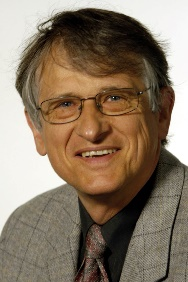 |
Klaus von Klitzing was born in 1943 in Schroda. He received his PhD from the University of Würzburg in 1972. After research stays in England, USA and France he became a Professor at the Technical University in Munich in 1980. Between 1985 - 2018 he was director at the Max Planck Institute for Solid State Research in Stuttgart, Germany. He has been awarded the Nobel Prize in Physics in 1985 for the discovery of the Quantum Hall Effect. This quantum effect opened a new research field and plays a major role in metrology, not only as a resistance standard RK=h/e2 with the Planck constant h and the elementary charge e, but also in connection with the realization of a new SI system, based on fundamental constants.
He has published more than 500 papers in the field of semiconductor quantum structures and received a large number of national and international awards. He holds 22 honorary degrees and is a foreign member of the National Academy of Sciences of the United States of America, the Russian Academy of Sciences, the Royal Society of London, the Chinese Academy of Sciences and the Pontifical Academy of Sciences. |
- Professor Gerard Albert Mourou, Nobel Pize for Physics in 2018
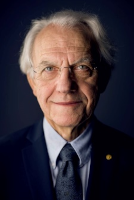 |
Gérard Mourou was born in Albertville, France. He studied physics at the University of Grenoble and then at the Université Pierre-et-Marie-Curie in Paris, where he earned his PhD in 1973. He later moved to the United States and became a professor at the University of Rochester, where he did his Nobel Prize awarded work along with Donna Strickland. He subsequently worked at the University of Michigan and the École Polytechnique in Paris. The sharp beams of laser light have given us new opportunities for deepening our knowledge about the world and shaping it. In 1985, Donna Strickland and Gérard Mourou succeeded in creating ultrashort high-intensity laser pulses without destroying the amplifying material. First they stretched the laser pulses in time to reduce their peak power, then amplified them, and finally compressed them. The intensity of the pulse then increases dramatically. Chirped pulse amplification has many uses, including corrective eye surgeries. He advanced laser science in Europe through his proposal of the Extreme Light Infrastructure, which consists of three facilities with extremely powerful lasers in the Czech Republic, Romania, and Hungary. |
- Professor Rodrigo Ferrao de Paiva Martins, Director of CENIMAT|i3N & CEMOP/UNINOVA, President of European Academy of Sciences - EurASc
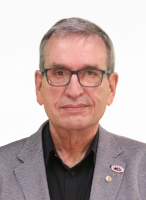 |
Rodrigo Martins was born in Nova Lisboa, Angola. He got in 1974 the Honours degree in Electronics Engineering, Telecommunications and applied Electronics by U. Luanda, Angola/Portugal. In 1977 he got the MSc degree in Semiconductor Materials, by the University of Dundee, Scotland, with a thesis entitled “Photoconductivity in P Doped and Undoped Amorphous Germanium” under supervision of Prof. W. Spear, 1977 Euro physicist award. In 1982 he obtained the Ph.D. in Energy conversion and Semiconductors, by New University of Lisbon, Portugal. PhD thesis title was “a-Si:H solar cells processing and characterization”. In 1988 he got the Habilitation in Semiconductor Materials and Microelectronics, by New University of Lisbon, Portugal. Rodrigo Martins is now the President of the EurASc - European Academy of Sciences, Full Professor of Faculty of Sciences and Technology of New University of Lisbon in the field of Advanced Functional Materials and Microelectronics, Director of the Centre of Excellence in Microelectronics and Optoelectronics Processes of the Institute of New Technologies – CEMOP and Director of the Centre of Advanced Materials, CENIMAT. He is also President of the administration board of the Portuguese cluster in Advanced Materials (NANOMAT), member of the administration board of the Portuguese cluster on Batteries (BatPower), Chair of the European Committee Affairs of European Materials Research Society and Editor in Chief of the Journal Materials Discover, from Nature-Springer, member of the international advisory board of Advanced Electronics Materials. Rodrigo Martins published more than 1000 papers and has an h-index of 92. |
- Professor Elvira Fortunato, Department of Materials Science of the Faculty of Science and Technology of the NOVA University of Lisbon
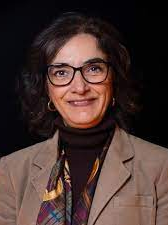 |
Elvira Fortunato, Minister of Science, Technology and Higher Education of the government of Portugal, is a Professor at the Department of Materials Science of the Faculty of Science and Technology of the NOVA University of Lisbon. She has pioneered European research in transparent electronics using sustainable materials and environmentally friendly technologies. In 2008, in the 1st edition of the European Research Council (ERC) grants, she won an Advanced Grant with the INVISIBLE project, considered by the European Commission a success story. In the same year she demonstrated with his group the possibility of making the first paper transistor, starting a new field in the area of paper electronics. In 2018 she received the second Advanced Grant with the DIGISMART project. With more than 850 scientific publications, 58 patents conceived, Elvira Fortunato has received, in recent years, more than 30 international awards and distinctions for her work, including the decoration with the degree of Grand Officer of the Order of Prince Henry the Navigator, by the President of the Portuguese Republic in 2010; the Blaise Pascal Medal in 2016; the Czochralski Prize in 2017; the 2020 Pessoa Prize; the European Commission's Horizon Impact Award in 2020 with the INVISIBLE project; the Strait of Magellan Prize from the Government of Chile in 2020; the International Engineering Award in 2021; the Human Rights Award by the Assembly of the Republic in 2021; The Materials Frontiers Award 2022, given by IUMRS and Chinese-MRS; the SPM career recognition award 2022. Moreover, her work in the area of green electronics and paper electronics has been considered one of the 20 best ever innovators in Europe. She is an elected member of the Academy of Engineering, the European Academy of Sciences, the Lisbon Academy of Sciences and the Academia Europaea. She was a member of the Board of Trustees of the Luso-American Development Foundation between 2014 and 2021. She was a member of the High-Level Group for the European Commission's Scientific Advice Mechanism between 2015 and 2020. She has coordinated several national and international projects, including her pioneering activity at Universidade Nova de Lisboa in the area of equal opportunities through the SPEAR project, a European platform for the support and implementation of plans for gender equality in higher education institutions. |
- Professor Thomas Schroeder, Director IKZ Berlin
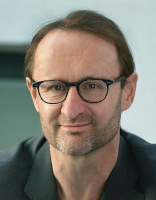 |
Thomas Schroeder is Scientific Director of the Leibniz-Institut für Kristallzüchtung (IKZ) in Berlin and Professor in Crystal Growth at the Institute of Physics of the Humboldt University zu Berlin. His R&D interests are focused on innovations in crystalline materials (numerical simulation, plant engineering, growth techniques etc.) and innovations by crystalline materials (crystal preparation techniques, applications of crystalline materials in electronics and photonics etc.). Since 2004, Thomas Schroeder worked in the Materials Science Department of the Leibniz-Institute for innovative Microelectronics (IHP) in Frankfurt (Oder) where he became department head in 2009 and full professor in semiconductor physics at the Technical University of Brandenburg in Cottbus in 2012. The PhD thesis was carried out from 1998 to 2001 at the Fritz-Haber-Institute of the Max-Planck Society in Berlin on catalytic processes. He received a diploma degree in Chemistry in 1996 and a diploma degree in Physics in 1998 from the University of Tübingen. He passed several research and PostDoc stays in European institutes in Italy, Spain and France. |
- Professor Paolo Fornasiero, University of Trieste, Italy
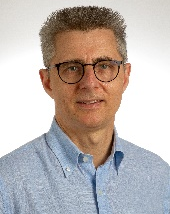 |
Paolo Fornasiero is Professor of Inorganic Chemistry at the University of Trieste. His scientific interests are in the field of inorganic chemistry, with attention to the design and development of multi-functional nano-systems and their advanced applications in energy related processes and environmental heterogeneous catalysis. Paolo Fornasiero has published more than 300 research articles, 19 book chapters, and holds 4 patents. Since 2022 he is member of the Academia Europaea and from 2021 he is member of the European Academy of Sciences. He received various awards including the 2005 Nasini Medal, the 2013 Chiusoli Medal and the Malatesta award from the Italian Chemical Society, the 2016 Heinz Heinemann Award from the International Association of Catalysis Societies. |
- Professor Adrian M. Ionescu, EPFL Lausanne, Switzerland
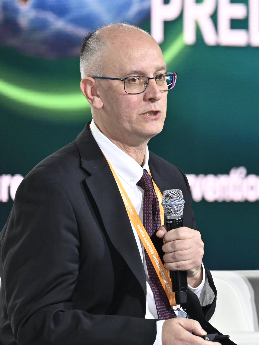 |
Adrian M. Ionescu is a Full Professor at Ecole Polytechnique Fédérale de Lausanne (EPFL), Switzerland. He received the BS & MS in Electronics and Telecommunications in 1989 from University ‘Politehnica’ Bucharest, Romania. He holds two PhDs: in Microelectronics, from UPB (1994) and in Physics of semiconductors from National Polytechnic Institute Grenoble (1997). He is director of Nanoelectronic Devices Laboratory of EPFL, Switzerland. His group pioneered novel device concepts and technologies for energy efficient Edge Artificial Intelligence and Internet of Things applications. He published more than 600 articles. He is recipient of IBM Faculty Award 2013 and of André Blondel Medal 2009. In 2015 he was elected member of Swiss Academy of Technical Sciences. He received an ERC Advanced Grant in 2016, a ERC Synergy grant in 2023 and the EDL IEEE George Smith Award in 2017. He is an IEEE Fellow and he served as Editor of IEEE TED and as member of PUB committee of EDS. He is a member of the Editorial Board of Proceedings of IEEE. Recently, he received the prestigious 2024 IEEE Cledo Brunetti field Award. |
- Professor Rafal Dunin-Borkowski, Institute for Microstructure Research and the Ernst Ruska-Centre for Microscopy and Spectroscopy with Electrons in Forschungszentrum Jülich, Germany
 |
Rafal Dunin-Borkowski is Director of the Institute for Microstructure Research and the Ernst Ruska-Centre for Microscopy and Spectroscopy with Electrons in Forschungszentrum Jülich, Germany. His Ph.D. (1990-1994) was carried out in the Department of Materials Science and Metallurgy in the University of Cambridge. After working as a postdoctoral research scientist in the University of Cambridge, Arizona State University and Oxford University, between 2000 and 2006 he held a Royal Society University Research Fellowship in the University of Cambridge. Between 2007 and 2010, he led the establishment of the Center for Electron Nanoscopy in the Technical University of Denmark. He specializes in the characterization of magnetic and electronic materials at the highest spatial resolution using advanced transmission electron microscopy techniques, including aberration-corrected high-resolution transmission electron microscopy and off-axis electron holography. In 2009 he was awarded the Ernst Ruska Prize of the German Society for Electron Microscopy. In 2012, 2017 and 2019 he was awarded Advanced, Proof of Concept and Synergy Grants by the European Research Council. |
|












